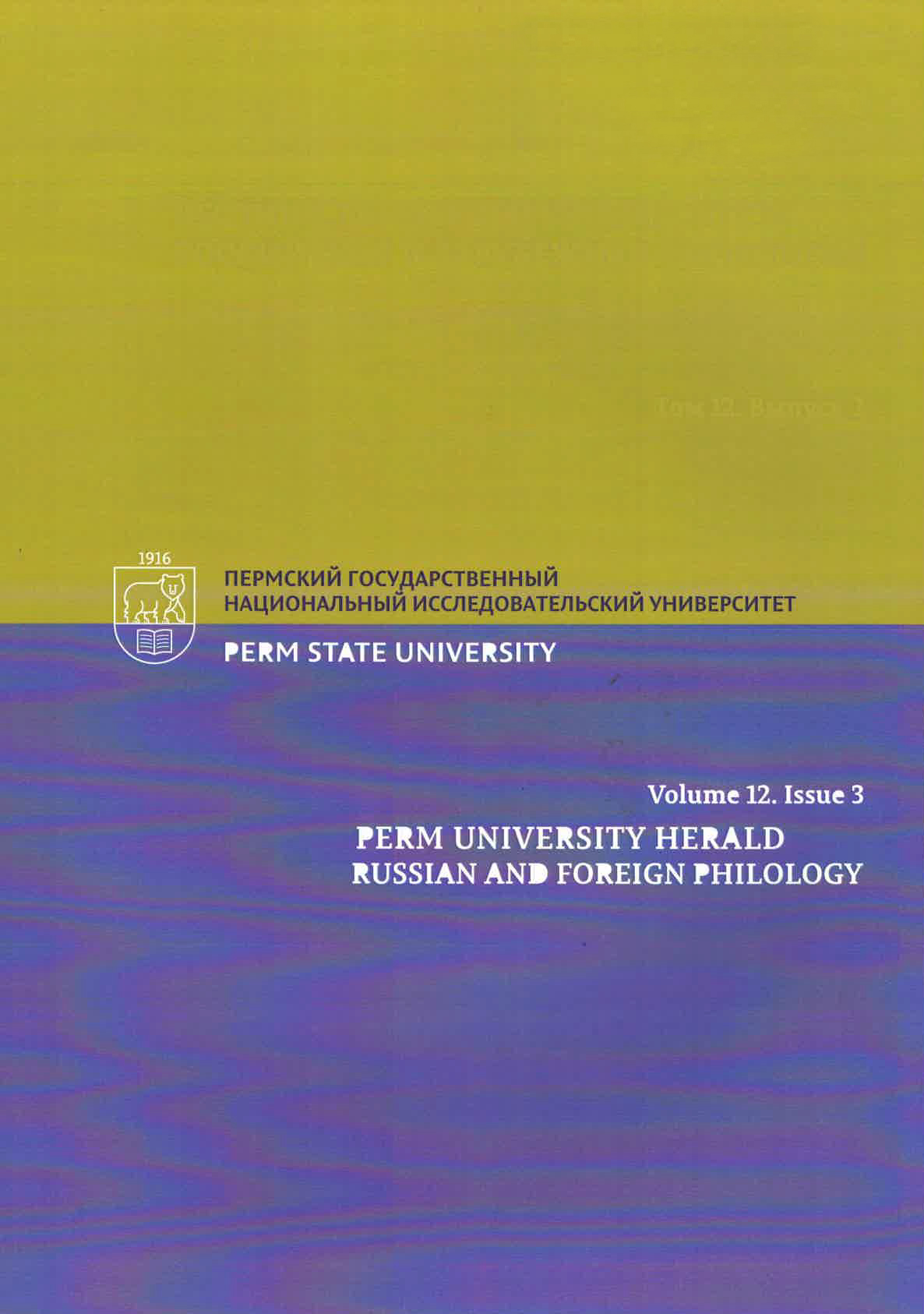STUDYING THE AXIOLOGICAL CONTENT OF A LITERARY WORK
DOI:
https://doi.org/10.17072/2073-6681-2020-3-116-123Keywords:
the idea of a literary work, the main idea of creative activities, the internal idea, the external idea, axi-ology, form, content.Abstract
The article deals with the problem of identifying and studying axiological ideas of a writer which have found expression in his/her work. Values form the basis of a writer’s (as well as any person’s) worldview and originate from their religious, philosophical, ethical and aesthetic ideas. Due to external or internal reasons, some idea is actualized in the writer’s mind and by means of his / her talent turns into the idea of a literary work. The combination of literary forms and means of implementing various aspects of the writer’s idea creates the content of the work.The idea of a literary work occupies the dominant position in relation to all the elements of its content and form, and therefore it has repeatedly become a subject of scientific consideration. One of its results has been the discovery of a complex internal structure of a literary work idea. The author of the article summarizes the obtained experience using theoretically justified terms to describe the structure of the idea: an external idea, an internal idea, the main idea, and ideological synthesis. Deep and complete understanding of the essence of a literary work idea and its connection with the idea of the writer’s individual consciousness allowed the author of the article to formulate the method making it possible to study the process of implementing the writer's axiological ideas into the images of his / her work. The method is based on the principle of simultaneous and continuous movement from the form of a literary work to its content, and from the content – to its form. The form is studied by means of philological analysis, while the content is analyzed with the help of fideistic resources. The data obtained while studying each element of the form and content are mutually supplemented and verified, resulting in a complete and consistent view of the literary work content.References
Абрамович Г. Л. Введение в литературоведение. 7-е изд., испр. и доп. М.: Просвещение, 1979. 352 с.
Ветловская В. Е. Анализ эпического произведения: Проблемы поэтики. СПб.: Наука, 2002. 213 с.
Виноградов И. И. Проблемы содержания и формы литературного произведения. М.: Изд-во МГУ, 1958. 216 с.
Гегель Г. В. Ф. Эстетика: в 4 т. М.: Искусство, 1968. Т. 1. 312 с.
Достоевский Ф. М. Полн. собр. соч.: в 30 т. Л.: Наука, 1972–1990.
Кашина Н. В. Эстетика Ф. М. Достоевского: учеб. пособие. 2-е изд., испр. и доп. М.: Высш. шк., 1989. 288 с.
Крупчанов Л. М. Теория литературы: учебник. М.: ФЛИНТА: Наука, 2012. 360 с.
Лосев А. Ф. Знак. Символ. Миф. М.: Изд-во Моск. ун-та, 1982. 480 с.
Поспелов Г. Н., Николаев П. А., Волков И. Ф. и др. Введение в литературоведение: учебник для филол. спец. ун-тов / под ред. Г. Н. Поспелова.
-е изд., испр. и доп. М.: Высш. шк., 1988. 527 с.
Потебня А. А. Мысль и язык. Киев: СИНТО, 1993. 192 с.
Скафтымов А. П. Нравственные искания русских писателей. Статьи и исследования о русских классиках. М.: Худож. лит., 1972. 543 с.
Скафтымов А. П. Поэтика художественного произведения / сост. В. В. Прозоров, Ю. Н. Борисов; вступ. ст. В. В. Прозорова. М.: Высш. шк., 2007. (Классика литературной науки). 535 с.
Федосеева Т. В. Введение в литературоведение: литературоведение: учеб. пособие / Рязан. гос. ун-т им. С. А. Есенина. Рязань, 2011. 212 с.
Хализев В. Е. Теория литературы: учебник.
-е изд., испр. и доп. М.: Высш. шк., 2002. 437 с.
References
Abramovich G. L. Vvedenie v literaturovedenie [Introduction to literary studies]. 7th revised and enlarged ed. Moscow, Prosveshcheniye Publ., 1979. 352 p. (In Russ.)
Vetlovskaya V. E. Analiz epicheskogo proizvedeniya: Problemy poetiki [Analysis of an epic work: Issues of poetics]. St. Petersburg, Nauka Publ., 2002. 213 p. (In Russ.)
Vinogradov I. I. Problemy soderzhaniya i formy literaturnogo proizvedeniya [Issues of the content and form of a literary work]. Moscow, Moscow University Press, 1958. 216 p. (In Russ.)
Hegel G. W. F. Estetika: v 4 t. [Aesthetics: in 4 vols.]. Moscow, Iskusstvo Publ., 1968, vol. 1. 312 p. (In Russ.)
Dostoevsky F. M. Poln. sobr. soch.: v 30 t. [Complete collection of works: In 30 vols.]. Leningrad, Nauka Publ., 1972–1990. (In Russ.)
Kashina N. V. Estetika F. M. Dostoevskogo: Ucheb. posobie [The aesthetics оf F. M. Dostoevsky: Textbook]. 2nd revised and enlarged ed. Moscow, Vysshaya shkola Publ., 1989. 288 p. (In Russ.)
Krupchanov L. M. Teoriya literatury: uchebnik [Theory of literature: Textbook]. Moscow, FLINTA: Nauka Publ., 2012. 360 p. (In Russ.)
Losev A. F. Znak. Simvol. Mif [Sign. Symbol. Myth]. Moscow, Moscow University Press, 1982. 480 p. (In Russ.)
Potebnya A. A. Mysl’ i yazyk [Thought and language]. Kiev, SINTO Publ., 1993. 192 p. (In Russ.)
Pospelov G. N., Nikolaev P. A., Volkov I. F. i dr.; Vvedenie v literaturovedenie: uchebnik dlya filol. spets. un-tov [Introduction to literary studies: Textbook for university students of philological specialities]. Ed. by G. N. Pospelov. 3rd revised and enlarged ed. Moscow, Vysshaya shkola Publ., 1988. 527 p. (In Russ.)
Skaftymov A. P. Nravstvennye iskaniya russkikh pisateley. Stat’i i issledovaniya o russkikh klassikakh [The Russian writers’ moral pursuits. Articles and studies on Russian classics]. Moscow, Khudozhestvennaya literatura Publ., 1972. 543 p. (In Russ.)
Skaftymov A. P. Poetika khudozhestvennogo proizvedeniya [Poetics of a literary work]. Comp. by V. V. Prozorov, Yu. N. Borisov; introd. article by V. V. Prozorov. Moscow, Vysshaya shkola Publ., 2007. 535 p. (In Russ.)
Fedoseeva T. V. Vvedenie v literaturovedenie: literaturovedenie: ucheb. posobie [Introduction to literary studies: Literary studies: Textbook]. Ryazan, Ryazan State University Press, 2011. 212 p. (In Russ.)
Khalizev V. E. Teoriya literatury: uchebnik [Theory of literature: Textbook]. 3rd revised and enlarged ed. Moscow, Vysshaya shkola Publ., 2002. 437 p. (In Russ.)




